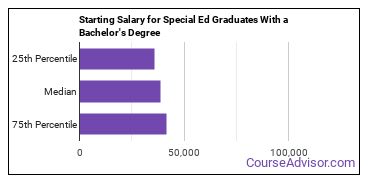Special Education
Featured schools near , edit
Types of Degrees Special Education Majors Are Getting
The following table lists how many special education graduations there were in 2020-2021 for each degree level.
| Education Level | Number of Grads |
|---|---|
| Master’s Degree | 21,797 |
| Bachelor’s Degree | 9,368 |
| Graduate Certificate | 3,157 |
| Associate Degree | 1,328 |
| Basic Certificate | 713 |
| Undergraduate Certificate | 225 |
| Doctor’s Degree | 204 |
What Special Education Majors Need to Know
O*NET surveyed people in occupations related to special ed and asked them what knowledge areas, skills, and abilities were important for their jobs. The responses were rated on a scale of 1 to 5 with 5 being most important.
Knowledge Areas for Special Ed Majors
This major prepares you for careers in which these knowledge areas are important:

- Education and Training - Knowledge of principles and methods for curriculum and training design, teaching and instruction for individuals and groups, and the measurement of training effects.
- English Language - Knowledge of the structure and content of the English language including the meaning and spelling of words, rules of composition, and grammar.
- Psychology - Knowledge of human behavior and performance; individual differences in ability, personality, and interests; learning and motivation; psychological research methods; and the assessment and treatment of behavioral and affective disorders.
- Customer and Personal Service - Knowledge of principles and processes for providing customer and personal services. This includes customer needs assessment, meeting quality standards for services, and evaluation of customer satisfaction.
- Clerical - Knowledge of administrative and clerical procedures and systems such as word processing, managing files and records, stenography and transcription, designing forms, and other office procedures and terminology.
Skills for Special Ed Majors
When studying special ed, you’ll learn many skills that will help you be successful in a wide range of jobs - even those that do not require a degree in the field. The following is a list of some of the most common skills needed for careers associated with this major:

- Active Listening - Giving full attention to what other people are saying, taking time to understand the points being made, asking questions as appropriate, and not interrupting at inappropriate times.
- Speaking - Talking to others to convey information effectively.
- Reading Comprehension - Understanding written sentences and paragraphs in work related documents.
- Instructing - Teaching others how to do something.
- Social Perceptiveness - Being aware of others' reactions and understanding why they react as they do.
Abilities for Special Ed Majors
As a special ed major, you will find yourself needing the following abilities:

- Oral Expression - The ability to communicate information and ideas in speaking so others will understand.
- Oral Comprehension - The ability to listen to and understand information and ideas presented through spoken words and sentences.
- Written Comprehension - The ability to read and understand information and ideas presented in writing.
- Speech Clarity - The ability to speak clearly so others can understand you.
- Written Expression - The ability to communicate information and ideas in writing so others will understand.
What Can You Do With a Special Education Major?
People with a special ed degree often go into the following careers:
| Job Title | Job Growth Rate | Median Salary |
|---|---|---|
| Adapted Physical Education Specialists | 9.9% | $56,680 |
| Interpreters and Translators | 17.7% | $49,930 |
| Special Education Teachers, Kindergarten and Elementary School | 7.4% | $59,390 |
| Special Education Teachers, Middle School | 7.2% | $60,250 |
| Special Education Teachers, Preschool | 11.3% | $55,840 |
| Special Education Teachers, Secondary School | 7.4% | $60,600 |
Who Is Getting a Bachelor’s Degree in Special Education?
Racial-Ethnic Diversity
At the countrywide level, the racial-ethnic distribution of special ed majors is as follows:

| Race/Ethnicity | Number of Grads |
|---|---|
| Asian | 116 |
| Black or African American | 401 |
| Hispanic or Latino | 987 |
| White | 7,315 |
| International Students | 36 |
| Other Races/Ethnicities | 513 |
Geographic Diversity
Americans aren’t the only ones with an interest in Special Ed. About 0.4% of those with this major are international students. The most popular countries for students from outside the country are:
- Saudi Arabia
- China
- South Korea
- Canada
- India
How Much Do Special Education Majors Make?
Bachelor’s Degree Starting Salary
Data from the U.S. Department of Education shows that special education students who graduated in 2017-2019 with a bachelor’s degree made a median starting salary of $38,748 per year. During this timeframe, most salaries fell between $35,725 (25th percentile) and $41,583 (75th percentile).

One thing to note here is that not all of these people may be working in careers related to special ed.
Salaries According to BLS
Special Ed majors often go into careers where salaries can range from $61,610 to $64,390 (25th to 75th percentile). This range includes all degree levels, so you may expect those with a more advanced degree to make more while those with less advanced degrees will typically make less.
To put that into context, according to BLS data from the first quarter of 2020, the typical high school graduate makes between $30,000 and $57,900 a year (25th through 75th percentile). The average person with a bachelor’s degree (any field) makes between $45,600 and $99,000. Advanced degree holders make the most with salaries between $55,600 and $125,400.
Amount of Education Required for Careers Related to Special Education
Some careers associated with special ed require an advanced degree while some may not even require a bachelor’s. In general, the more advanced your degree the more career options will open up to you. However, there is significant time and money that needs to be invested into your education so weigh the pros and cons.
Find out what the typical degree level is for special ed careers below.

| Education Level | Percentage of Workers |
|---|---|
| High School Diploma - or the equivalent (for example, GED) | 0.1% |
| Post-Secondary Certificate - awarded for training completed after high school (for example, in agriculture or natural resources, computer services, personal or culinary services, engineering technologies, healthcare, construction trades, mechanic and repair technologies, or precision production) | 0.1% |
| Some College Courses | 0.4% |
| Associate’s Degree (or other 2-year degree) | 1.8% |
| Bachelor’s Degree | 52.9% |
| Post-Baccalaureate Certificate - awarded for completion of an organized program of study; designed for people who have completed a Baccalaureate degree but do not meet the requirements of academic degrees carrying the title of Master. | 13.8% |
| Master’s Degree | 27.0% |
| Post-Master’s Certificate - awarded for completion of an organized program of study; designed for people who have completed a Master’s degree but do not meet the requirements of academic degrees at the doctoral level. | 2.2% |
| First Professional Degree - awarded for completion of a program that: requires at least 2 years of college work before entrance into the program, includes a total of at least 6 academic years of work to complete, and provides all remaining academic requirements to begin practice in a profession. | 1.5% |
| Doctoral Degree | 1.0% |
Online Special Education Programs
In 2020-2021, 994 schools offered a special ed program of some type. The following table lists the number of programs by degree level, along with how many schools offered online courses in the field.
| Degree Level | Colleges Offering Programs | Colleges Offering Online Classes |
|---|---|---|
| Certificate (Less Than 1 Year) | 0 | 0 |
| Certificate (1-2 years) | 59 | 5 |
| Certificate (2-4 Years) | 3 | 0 |
| Associate’s Degree | 94 | 6 |
| Bachelor’s Degree | 432 | 135 |
| Post-Baccalaureate | 0 | 0 |
| Master’s Degree | 945 | 212 |
| Post-Master’s | 157 | 0 |
| Doctor’s Degree (Research) | 83 | 3 |
| Doctor’s Degree (Professional Practice) | 2 | 0 |
| Doctor’s Degree (Other) | 1 | 1 |
Is a Degree in Special Education Worth It?
The median salary for a special ed grad is $62,500 per year. This is based on the weighted average of the most common careers associated with the major.
This is 57% more than the average salary for an individual holding a high school degree. This adds up to a gain of about $452,000 after 20 years!

Top Ranking Lists for Special Education
Explore Major by State
Alabama
California
District of Columbia
Idaho
Kansas
Maryland
Mississippi
Nevada
New York
Oklahoma
South Carolina
Utah
West Virginia
Alaska
Colorado
Florida
Illinois
Kentucky
Massachusetts
Missouri
New Hampshire
North Carolina
Oregon
South Dakota
Vermont
Wisconsin
Majors Related to Special Education
You may also be interested in one of the following majors related to special ed.
| Major | Number of Grads |
|---|---|
| Teacher Education Grade Specific | 110,226 |
| Educational Administration | 46,469 |
| Teacher Education Subject Specific | 43,297 |
| General Education | 29,810 |
| Curriculum & Instruction | 19,832 |
| Student Counseling | 13,858 |
| Instructional Media Design | 8,695 |
| Teaching English or French | 5,791 |
| Other Education | 4,858 |
| Teaching Assistants | 2,751 |
| Educational Assessment | 2,552 |
| Multilingual Education | 1,910 |
| Education Philosophy | 737 |
| International Education | 293 |
References
*The racial-ethnic minorities count is calculated by taking the total number of students and subtracting white students, international students, and students whose race/ethnicity was unknown. This number is then divided by the total number of students at the school to obtain the racial-ethnic minorities percentage.
- College Factual
- College Scorecard
- National Center for Education Statistics
- O*NET Online
- U.S. Bureau of Labor Statistics
- Usual Weekly Earnings of Wage and Salary Workers First Quarter 2020
- Image Credit: By woodleywonderworks under License
More about our data sources and methodologies.
Featured Schools
 Request Info
Request Info
|
Southern New Hampshire University You have goals. Southern New Hampshire University can help you get there. Whether you need a bachelor's degree to get into a career or want a master's degree to move up in your current career, SNHU has an online program for you. Find your degree from over 200 online programs. Learn More > |

